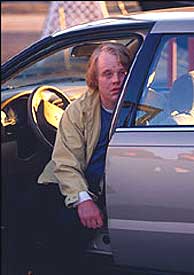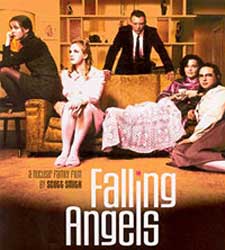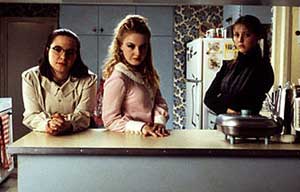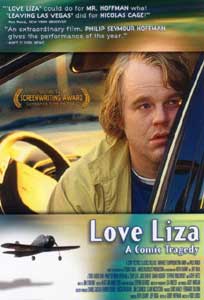Although Love Liza (2002) is occasionally very oddly funny, the fact of its being advertised as "a comic tragedy" is a bit of a promotional stretch. A more truthful "completely downbeat misery-laden film that'll leave you as depressed as the hero" probably wouldn't sell.
It is however an exceptional film with a more than exceptional central performance by Philip Seymour Hoffman (of Oscar-winning Capote fame). The support performance from Kathy Bates is scarsely less weirdly perfect.
 Real human beings tend to be odder & more complex than the fictional characters of cinema. What Hoffman brings to Love Liza is that greater sense of a complex real person rather than mere character in a story. It's not all his genius alone, either, because the script, by the star's brother Gordy Hoffman, refuses to follow the usual pattern of such dramas. It could easily have been done as a "disease of the week" type telefilm, but it's oh so much better than such pablum. The script gives Hoffman everything he needs to present a figure who is realistically bizarre. Real human beings tend to be odder & more complex than the fictional characters of cinema. What Hoffman brings to Love Liza is that greater sense of a complex real person rather than mere character in a story. It's not all his genius alone, either, because the script, by the star's brother Gordy Hoffman, refuses to follow the usual pattern of such dramas. It could easily have been done as a "disease of the week" type telefilm, but it's oh so much better than such pablum. The script gives Hoffman everything he needs to present a figure who is realistically bizarre.
Wilson (Hoffman) is deeply, deeply depressed over his wife's suicide. She left him a suicide note which he is afraid to open, fearful it will reveal what he did that was so wrong that she could not continue in life. His mother-in-law (Bates) is grieving with less visible lunacy, but as the story progresses, there's no question but that her suffering has made her pretty strange as well.
Though he has been given a lot of slack at his computer-nerd job, given his tragic experience, he manages even so to screw up every element of his life while turning to huffing gasoline to obliterate his misery. When someone notices his apartment smells of gasoline, he tells one of his many lies, that he's making a model airplane, & soon finds himself befriended by a chap (Jack Kehler) who believes Wilson is a genuine "radio control" freak like himself.
To cover up his lie, Wilson buys a radio control airplane, & he does rise out of his gloom (but not his huffing addiction) for a while, getting involved with "R-C" fandom, visiting a lakeside gathering of radio control boat racers with his new pal. Wilson makes an ass of himself trying to swim out among the dangerously swift toy hydroplanes, but at least he is momentarily removed from his otherwise unebbing gloom.
Each time he almost rises from darkness, that letter remains unopened, that threat of blame, or if not blame, then a moment of complete finality when the last connection with his wife is used up. Since he keeps huffing gasoline, he continues his descent.
It is not a film entirely devoid of hope, but it comes close. The final reading of the letter is a bit anticlimactic & is in fact so generous that one might doubt anyone could write it while in a suicidal pique. The closing image of Wilson in the street in his underpants could imply either that he has cleansed himself of everything & can finally rebuild anew, or only that he's about to be arrested for public indecency & start huffing again as soon as he makes bail.
Dark, sad, & in its own way beautiful, if fine acting & a painfully real story aren't enough to get your eyes in front of a film of this calibre, well no wonder people get depressed.
 If the mind could stand a double dose of the downbeat, another moving film about depression is Falling Angels (2005) from Canada, based on a novel by Barbara Gowdy. If the mind could stand a double dose of the downbeat, another moving film about depression is Falling Angels (2005) from Canada, based on a novel by Barbara Gowdy.
The characters are as deeply played as in any Atom Egoyan film, so Scott Smith is bound to be a director to keep an eye out for. The script, by Esta Spalding, is beautifully written. It's hard to believe it's a telefilm (which Canadians do better than in the USA) or that Smith has been primarily a television director, for this is better than the best independent features at Sundance.
Miranda Richardson plays a mother enervated by depression. Day in day out, year in year out, she stays in bed, or on the sofa in front of the television, rarely getting up, cared for in turns by her three daughters.
Their father (Callum Keith Rennie) is a selfish brute who doesn't actually beat anyone, but does worse emotionally. He breaks furniture & possessions when he's enraged, & he gets enraged easily. When not destroying stuff, he manipulates & controls his family as a militaristic tyrant who seems barely capable of love.
For his own sake he does not want the neighbors to know his wife is mad. He does not admit she is clinically depressed; he would rather just believe she's crazy. On the rare occasion that she even wants to leave the house, she's not permitted, & if she escapes, the daughters are verbally abused for their failure & stuff gets broken.
He's monstrous & is the only character for whom we're never permitted to feel much empathy. Obviously he does suffer as much as anyone, with his need to control everyone born of profound insecurity. But he's the only one who comes damned close to deserving what he has brought upon himself. By comparison the daughters are victimized by these circumstances & easily forgiven even for their lapses.
 The focus of the film is in the lives & struggles of the three daughters. We know from the opening scene that it won't end well for mom, whose "accidental suicide" we will see in a shockingly poetic climax. We know from the start what horrible experience is in the three girls' future, & in flashbacks we find out how things have gone for them in the past. The focus of the film is in the lives & struggles of the three daughters. We know from the opening scene that it won't end well for mom, whose "accidental suicide" we will see in a shockingly poetic climax. We know from the start what horrible experience is in the three girls' future, & in flashbacks we find out how things have gone for them in the past.
It is winter of 1969; the final scenes will be set during New Years Eve ringing in 1970 with an almost eerie mixture of hope & trauma. Even in the worst of cirmustances, children frequently manage to survive & find their way out of darkness. What kind of adults these teenage girls may become is hard to guess, but it's not impossible that they'll pull through the worst of it & be all right. It's also possible they'll remain forever scarred.
Lou (Katharine Isabelle, brilliant young star of Ginger Snaps) is the angriest of the girls. She pushes at & tests her father's temper, & it's hard to know which of the two are meanest, though she's learned her meanness from him, & he's the one who should have been the adult.
Lou is not emotionally crippled by this difficult existence, however, & her rebellion seems partially healthy even if not ideal. She has an intact capacity for decency. When she is with her boyfriend, a draft-dodging American, she becomes completely human. Her affection for her ill mother is obvious. She's a brave, compelling character who refuses to be cowed by her father's poor sense of familial justice.
Norma (Monte Gagne) is overweight, oversensitive, artistic, introverted, with a good chance that she's going to grow up to be a dyke. The mutual crush that develops between her & her ditzy pretty schoolmate doesn't necessarily define her sexuality forever, but there's a good chance.
She is certainly a kindhearted & good girl in contrast to rebellious Lou. She builds a gorgeous secret shrine to her brother who died as an infant under suspicious circumstances -- having fallen or been chucked over Niagara Falls many years before -- one of the two chief sources of mom's debilitating depression.
Sandy (Kristin Adams) is the prematurely sexualized sister, pretty as a young movie star. Whether dad's ever been inappropriately attracted to her we do not know, but his behavior toward Norma during an "affectionate" interlude suggests he's an even worse father than the horrible father he already seems to be. Whether he's ever touched Sandy or not, his emotional abuse has definitely damaged her, & she seduces a disgusting older man (Mark McKinney) & gets pregnant in her inappropriately framed quest for any kind of father-figure's love.
I found myself hoping Sandy would be treated well by her pederastic lover, & I felt so bad for her as humiliation accumulates around her & her abusive father's name for her -- "Nymphomaniac" -- becomes something she is ready to believe about herself. She seems the least likely of the three girls to make it through these years intact, but she's a good kind girl full of potential, so maybe she'll cope with all this nightmare plus teenage motherhood better than most, maybe she won't. Quite likely her sisters will support her, so she does have a chance.
In flashbacks within the primary flashback we see the girls when they were younger, during an appalling two-week "vacation" their tyrannically militarist father imposed on his wife & daughters after having a fallout shelter buried in the back yard. The younger cast looks so much like the older actors, it's great casting Carman Fielding as young Lou, Melissa Brown as young Norma, & Courtney Goodison as the youngest, Sandy.
Buried in the back yard in the shelter, Jim seems to get increasingly unaware of the effects of what he is doing while his wife slowly loses her mind, Norma has her first period without any tampax, the air gets staler & more vile, & they start drinking the dishwater because dad miscalculated how much water they'd drink in two weeks. He keeps his four terrorized captives firmly imprisoned & they have to deal with his drunkenness & his anger over their dissatisfaction & woe.
Yes, it's a film of grotesque unhappinesses, but the girls are so likeable & we want so much for them to survive the ordeal of awful parents that the film is riveting as drama. It is even curiously uplifting at times. It might have been improved by allowing dad to convey a little more decency than he ever drums up, as sometimes his tyrannical behavior just makes it seem too bad someone doesn't just kill him. The six girls who play the three daughters, however, turn in performances so winning that Falling Angels belongs on the tippy-top of successful dramas.
The DVD of Falling Angels includes among the extras a short subject called Ten (2004). This is a three minute comedy completely at odds with the gloomy feature, & it got paired with Falling Angels because the directors have the same name. The Scott Smith who directed Ten, however, is not the same Scott Smith.
Chris Meister plays "the sinner" who breaks all ten commandments in exactly three minutes. That's the whole premise, but it is acted out quite wonderfully & very well photographed. After the heavy dose of depression from the main feature, it was nice to have a sick little chuckle.
copyright © by Paghat the Ratgirl
|

 Real human beings tend to be odder & more complex than the fictional characters of cinema. What Hoffman brings to Love Liza is that greater sense of a complex real person rather than mere character in a story. It's not all his genius alone, either, because the script, by the star's brother Gordy Hoffman, refuses to follow the usual pattern of such dramas. It could easily have been done as a "disease of the week" type telefilm, but it's oh so much better than such pablum. The script gives Hoffman everything he needs to present a figure who is realistically bizarre.
Real human beings tend to be odder & more complex than the fictional characters of cinema. What Hoffman brings to Love Liza is that greater sense of a complex real person rather than mere character in a story. It's not all his genius alone, either, because the script, by the star's brother Gordy Hoffman, refuses to follow the usual pattern of such dramas. It could easily have been done as a "disease of the week" type telefilm, but it's oh so much better than such pablum. The script gives Hoffman everything he needs to present a figure who is realistically bizarre.
 The focus of the film is in the lives & struggles of the three daughters. We know from the opening scene that it won't end well for mom, whose "accidental suicide" we will see in a shockingly poetic climax. We know from the start what horrible experience is in the three girls' future, & in flashbacks we find out how things have gone for them in the past.
The focus of the film is in the lives & struggles of the three daughters. We know from the opening scene that it won't end well for mom, whose "accidental suicide" we will see in a shockingly poetic climax. We know from the start what horrible experience is in the three girls' future, & in flashbacks we find out how things have gone for them in the past.